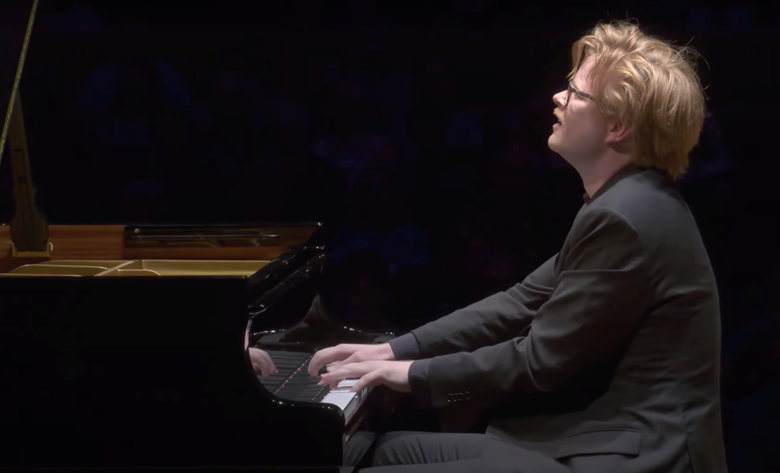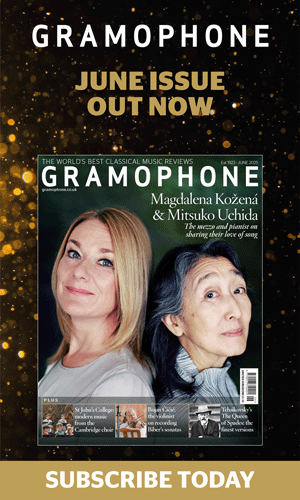Jed Distler's Cliburn Blog No 4: The Quarter-finals begin
Jed Distler
Sunday, May 25, 2025
'Carter Johnson’s jaunty groove in the first movement abounded in playfulness and propulsion'

Shangru Du was first to perform in this first of two days’ worth of Quarter-final rounds. Right off the bat, his Beethoven Fantasia, Op 77, displayed more colours, shadings and dramatic contrasts than Angel Stanislav Wang’s Preliminary-Round rendition (especially in the downward scales), while making more of the unexpected modulations. Perhaps it sounded more like a composition than the notated improvisation that scholars claim it to be, but why else would Beethoven have written it down? The angularity and springing repeated left-hand octaves of Du’s Scriabin Fantasy contrasted to Jonas Aumiller’s kaleidoscopic complexity. One could imagine a lighter, truly puckish Rachmaninov ‘Polichinelle’ (from the Op 3 Morceaux de fantaisie); the lyrical central section was anything but other-worldly. Du’s concluding Liszt Dante Sonata will win marks for immaculate preparation, but by being either very loud or very soft and not much else in between, I missed the scale of conception and narrative scope of Kotaro Shigemori’s Preliminary-Round performance.
Watch Shangru Du's performance:
Next Xiaofu Ju entered, sat silently for a while, slowly looked down at his hands, and then walked off the stage. The livestream made a smooth transition to pre-recorded material. Shortly thereafter a message appeared indicating that Mr Ju was unable to perform at this time, and that the programme would resume with Carter Johnson at 4.20pm local time, as originally scheduled.
For his Quarter-final set, Carter Johnson interspersed a selection of Brahms’s Klavierstücke, Op 76, between two short groupings selected from the Shostakovich’s Preludes, Op 34. Such programmatic mixing and matching may appear unorthodox or even gimmicky, yet Johnson’s choices yielded both intriguing musical contrasts and organic continuity. These qualities informed his playing as well. Time stood still as Johnson floated the delicate melodic threads of Shostakovich’s A major Prelude, No 7, which melted right into the gently interweaving counterpoint of Brahms’s Op 76 No 4. By contrast, Brahms’s cross-rhythmic intricacies in No 8’s burly textures played to Johnson’s powerful projection and intellectual rigour. Some of my colleagues have been talking up Johnson’s Bartók Sonata as if it was the greatest thing since sliced bread. Was it? I was about to find out. Happily, I concur with such positive judgement. Johnson’s jaunty groove in the first movement abounded in playfulness and propulsion, while the pianist’s full-throated chord voicings illuminated the slow movement’s gravitas. While the Finale generated plenty of drive, I was most taken with pianist’s ability to create and sustain tension in the softest moments.
Carter Johnson:
If David Khrikuli’s artistry in Scriabin and Ravel in the Preliminary round towed a line between languor and edginess, his Brahms and Liszt Quarter-final programme revealed a bigger, more imposing brand of pianism. Memorable takeaways from the Brahms Fantasien, Op 116, included an epically subjective No 3, No 4’s long lines that never wanted to end, yearning deliberation in No 5’s short phrases, and an unusually brisk and business-like No 6. Khrikuli’s Liszt Dante Sonata split the difference between Shangru Du’s detailed point and precision and Kotaro Shigemori’s big-picture mindset, while going its own galvanic way.
David Khrikuli:
Word came through at the end of Concert 1’s livestream that Xiaofu Ju has officially withdrawn from the competition, citing medical reasons. I wish him a speedy and healthy recovery. In the meantime, I’ll continue my first day Quarter-finals report in tomorrow’s blog entry, starting with thoughts on Aristo Sham’s eagerly anticipated account of Beethoven’s ‘Hammerklavier’ Sonata.
Gramophone is a Media Partner of The Cliburn International Piano Competition











